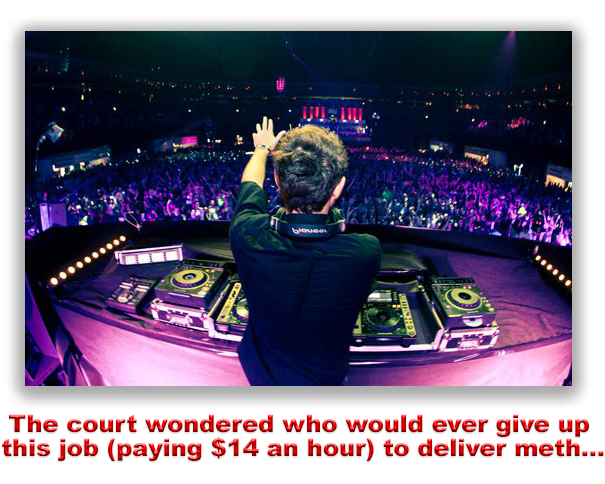We post news and comment on federal criminal justice issues, focused primarily on trial and post-conviction matters, legislative initiatives, and sentencing issues.

DO THE MATH
Christian Delgade-Lopezwas convicted of methamphetamine distribution. At sentencing, he argued for a reduction in his Sentencing Guidelines score for a minor role (USSG § 3B1.2), arguing he was just a simple DJ who was forced by circumstances to deliver meth for $1,000 a trip, and even having to pay his own expenses out of the grand he received.
 The district judge didn’t buy it. Based in part on information the judge had gathered on his own about gas prices and mileage, the court did a back-of-the-envelope calculation from the bench, and estimated Chris’s expenses per trip to be $730.00, leaving him with a net profit of $270.00. After learning that Chris made $14.00 an hour at his full-time job, the district court speculated he could have made $224,00 in two days at his regular DJ gig had he not acted as a drug courier. The judge, wondering why anyone would act as a drug courier for what amounted to a lousy $100.00 net gain over honest work, decided Chris’s testimony about being a mere courier simply was not believable. Besides, the court said, Chris refused to cooperate with the government, and thus should not benefit from a minor-role reduction.
The district judge didn’t buy it. Based in part on information the judge had gathered on his own about gas prices and mileage, the court did a back-of-the-envelope calculation from the bench, and estimated Chris’s expenses per trip to be $730.00, leaving him with a net profit of $270.00. After learning that Chris made $14.00 an hour at his full-time job, the district court speculated he could have made $224,00 in two days at his regular DJ gig had he not acted as a drug courier. The judge, wondering why anyone would act as a drug courier for what amounted to a lousy $100.00 net gain over honest work, decided Chris’s testimony about being a mere courier simply was not believable. Besides, the court said, Chris refused to cooperate with the government, and thus should not benefit from a minor-role reduction.
Last week, the 10th Circuit reversed Chris’s sentence. The Circuit admitted that a district court’s credibility findings should receive deference, but it ruled that nevertheless, a sentencing finding “must be based on evidence before the court, and thus in the record, and not on speculation or hypothesis.”
 In this case, the district court’s determination was based on pure speculation about the economics of the drug-trafficking scheme, without any evidence with which to evaluate the financial wisdom of Chris’s decision to be a drug courier. “Its impromptu calculations were based on speculation,” the 10th said, “that Jude could work more hours at his existing job, unfounded estimates about the costs involved in each of his trips, and the assumption that he knew of the relative financial benefits of the arrangement prior to accepting.” The court thus erred by relying on its own speculation, the Circuit held, in finding that Chris was not credible.
In this case, the district court’s determination was based on pure speculation about the economics of the drug-trafficking scheme, without any evidence with which to evaluate the financial wisdom of Chris’s decision to be a drug courier. “Its impromptu calculations were based on speculation,” the 10th said, “that Jude could work more hours at his existing job, unfounded estimates about the costs involved in each of his trips, and the assumption that he knew of the relative financial benefits of the arrangement prior to accepting.” The court thus erred by relying on its own speculation, the Circuit held, in finding that Chris was not credible.
What’s more, the district court was not entitled to hold that Chris’s lack of cooperation should deny him a minor-role reduction. The Guidelines “include a detailed explanation of what factors a court may and must consider,” the 10th held, “but does not mention cooperation. And although the determination requires a court to look at the totality of the circumstances, logic dictates that a defendant’s cooperation or lack thereof is entirely irrelevant to the factual determination of whether he or she played a minor role in an offense.”
United States v. Delgado-Lopez, 2020 U.S. App. LEXIS 29032 (10th Cir. Sept. 14, 2020)
– Thomas L. Root

